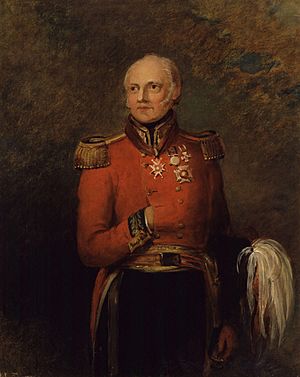George Scovell facts for kids
Quick facts for kids
Sir George Scovell
|
|
|---|---|

Sir George Scovell by William Salter
|
|
| Born | 21 March 1774 London |
| Died | 17 January 1861 (aged 86) Guildford |
| Buried |
Royal Military College, Sandhurst, cemetery
|
| Allegiance | |
| Service/ |
British Army |
| Rank | General |
| Battles/wars | Napoleonic Wars |
| Awards | Waterloo Medal Order of St. Vladimir GCB |
| Other work | Governor of the Royal Military College, Sandhurst |
Sir George Scovell (born March 21, 1774 – died January 17, 1861) was a British general. He is best known for his important work during the Napoleonic Wars, especially the Peninsular War in Spain and Portugal. He played a key role in breaking secret French codes. This helped the British army win major battles.
Contents
Military Adventures and Code-Breaking
George Scovell began his army career in 1798. He joined the 4th Queen's Own Dragoons. Early in his service, he helped with army supplies and movements.
Cracking Secret French Codes
Scovell was very good with languages. This skill became super important during the Peninsular War. He led a group called the Army Guides. This team included people from different countries. They worked together to listen in on French messages. Then, they tried to figure out what the messages meant.
In 1811, the French started using a new secret code. It used 150 different numbers. Scovell was able to crack this code in just two days! This was a huge achievement.
Later that year, the French used an even bigger code. It was called the Great Paris Code. This code used 1400 numbers. It was much harder to break. But by December 1812, Scovell had figured out enough of it. He could read a secret letter from Joseph Bonaparte to Napoleon. This letter shared French plans.
The information Scovell uncovered was vital. It helped Wellington and the British army. They used this knowledge to win the Battle of Vitoria in 1813. This victory was a turning point in the war.
Leading the First Military Police
In 1813, Scovell took on another important job. He was asked to create a new army unit. It was called the Staff Corps of Cavalry. This unit was the first official military police force in the British army.
These soldiers wore red uniforms. They helped keep order and escorted important people. Sometimes, they even fought in battles.
After the Wars
Scovell also served at the famous Battle of Waterloo. For his service, he received a special award from Russia. He was given the Order of St. Vladimir.
After the wars, Scovell continued his career. He became the Governor of the Royal Military College, Sandhurst. This is a famous military training school. He held this important position for many years, from 1837 to 1856. Scovell retired from the army as a general. He passed away in 1861. He was buried at the Royal Military College, Sandhurst.
Family Life
George Scovell married the daughter of Samuel Clowes in 1805. Her family was from Broughton, Lancashire.
Remembering Sir George Scovell
Today, there is a memorial to Sir George Scovell. It is in the Chapel at the Royal Military Academy Sandhurst. The memorial honors his service. It mentions his role with the Duke of Wellington during the Peninsular War and at Waterloo. It also notes his time as Governor of the College.
 | James Van Der Zee |
 | Alma Thomas |
 | Ellis Wilson |
 | Margaret Taylor-Burroughs |

